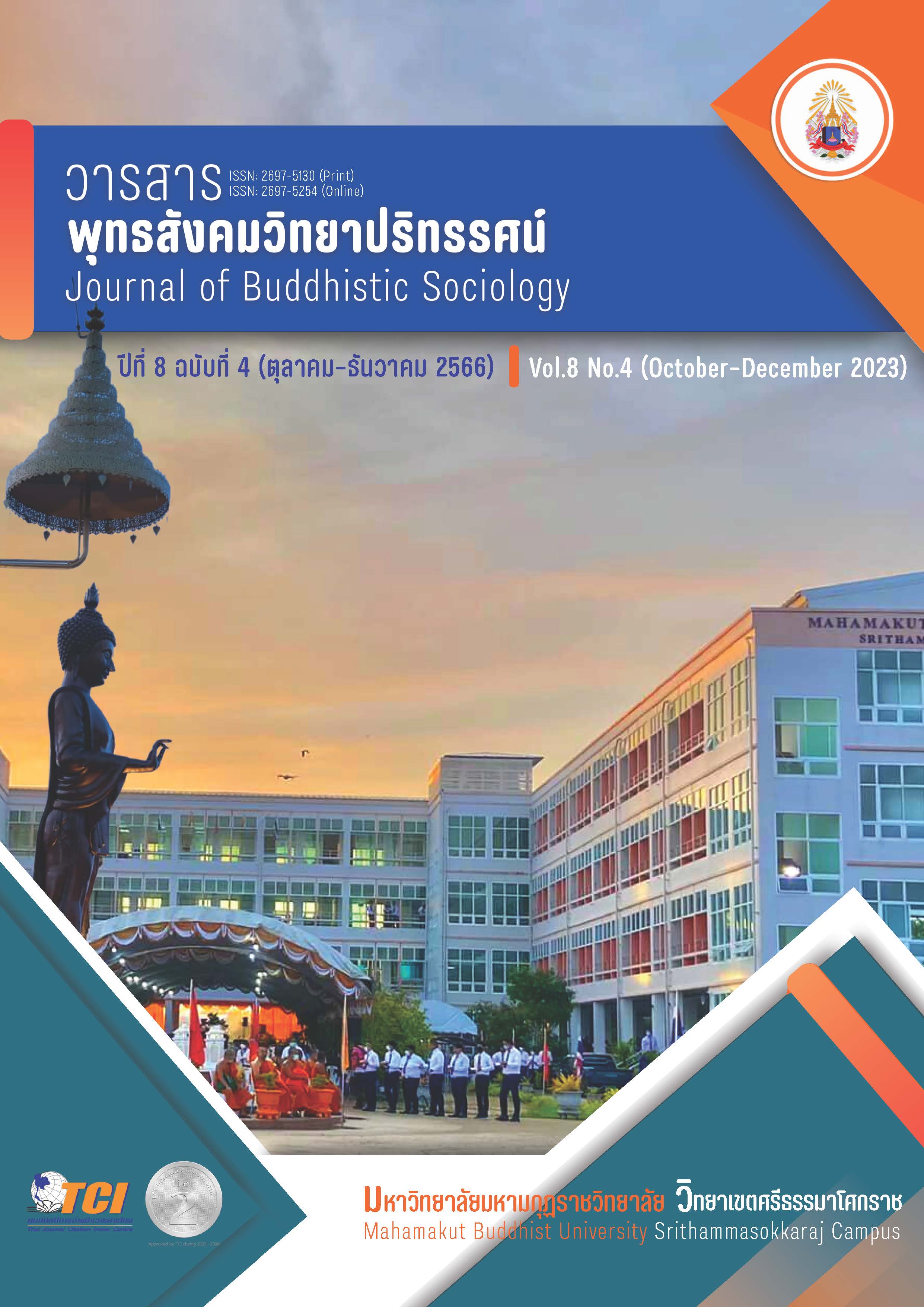ระบบการสอนสังคมศึกษาอิงหลักพุทธธรรมเพื่อเสริมสร้างคุณลักษณะที่พึงประสงค์สำหรับนักเรียนมัธยมศึกษาตอนปลายภาคเหนือตอนบน: กรณีศึกษาโรงเรียนพิริยาลัยจังหวัดแพร่
Main Article Content
บทคัดย่อ
การวิจัยนี้มีวัตถุประสงค์เพื่อ 1) ศึกษาองค์ความรู้เกี่ยวกับระบบการสอนสังคมศึกษาอิงหลักพุทธธรรมเพื่อเสริมสร้างคุณลักษณะที่พึงประสงค์สำหรับนักเรียนมัธยมศึกษาตอนปลายภาคเหนือตอนบน: กรณีศึกษาโรงเรียนพิริยาลัยจังหวัดแพร่ 2) ประเมินสภาพปัญหาและวามต้องการของระบบการสอนสังคมศึกษาในคุณลักษณะที่พึงประสงค์ 3) พัฒนาระบบการสอนสังคมศึกษาในคุณลักษณะที่พึงประสงค์ และ 4) ประเมินและรับรองระบบการสอนสังคมศึกษาในคุณลักษณะที่พึงประสงค์
การวิจัยแบบพัฒนาระบบการสอน (Research and Development) คือ การสำรวจ (Survey Research) จากกลุ่มตัวอย่าง จำนวน 217 คน และสัมภาษณ์ ผู้บริหาร/ครู 10 คน แบบเจาะจง (Purposive Selection) เครื่องมือได้แก่ และแบบสอบถาม (Questionnaire) และแบบสัมภาษณ์ (Interview)
ผลการวิจัยพบว่า
1. ด้านการศึกษาตามปัจจัยส่วนบุคคล เพศ หัวหน้าครอบครัวของนักเรียน รายได้ในครัวเรือนต่อเดือนของนักเรียน อาชีพหลักของครอบครัว สถานภาพสมรสของครอบครัว สถานภาพความเป็นอยู่ของนักเรียน ลักษณะโครงสร้างครอบครัว และการสัมภาษณ์ (Interview) ผู้บริหาร/ครู 10 ท่าน วิเคราะห์ตามสถานภาพองค์ความรู้การสอนสังคมศึกษาในคุณลักษณะที่พึงประสงค์ ด้านทาน ปิยวาจา อัตถจริยา และสมานัตตา โดยภาพรวมดี
2. ผลการประเมินด้านสภาพปัญหาและความต้องการของระบบการสอนสังคมศึกษาด้านมีจิตสาธารณะสำหรับนักเรียนชั้นมัธยมศึกษาปีที่ 4 โรงเรียนพิริยาลัยจังหวัดแพร่ ด้วย 5 ลักษณะของพฤติกรรม ได้แก่ 1) การแบ่งปันและช่วยเหลือผู้อื่น 2) การเข้าร่วมกิจกรรมส่วนรวม 3) การดูแลสาธารณะประโยชน์ 4) การกระทำเพื่อส่วนรวม 5) การเคารพสิทธิของผู้อื่น พบว่า ภาพรวมดี
3. ผลการพัฒนาระบบการสอนสังคมศึกษาด้วยจิตสาธารณะเป็นกระบวนการที่มุ่งเน้นให้ผู้เรียนร่วมในกิจกรรมหรือสถานการณ์และความพยายามของผู้เรียน 1) การพัฒนาทักษะด้านความรับผิดชอบ 2) การพัฒนาระบบค่านิยม 3) การพัฒนาทักษะด้านการสื่อสาร 4) การเรียนรู้และปฏิบัติตามหลักจริยธรรม พบว่า โดยภาพรวมดี
4. ผลการประเมินและรับรองระบบการสอน โดยคณะกรรมผู้ทรงคุณวุฒิสอบ Focus Group Discussion จำนวน 12 รูป/คน
Article Details

อนุญาตภายใต้เงื่อนไข Creative Commons Attribution-NonCommercial-NoDerivatives 4.0 International License.
เอกสารอ้างอิง
กรมวิชาการ. (2557). ผลการจัดการเรียนการสอนรายวิชาพระพุทธศาสนา. กรุงเทพมหานคร: คุรุสภาลาดพร้าว.
กระทรวงศึกษาธิการ. (2545). พระราชบัญญัติการศึกษาแห่งชาติ พ.ศ. 2542 และที่แก้ไขเพิ่มเติม (ฉบับที่ 2) พ.ศ. 2545. กรุงเทพมหานคร: คุรุสภา.
กระทรวงศึกษาธิการ. (2552). หลักสูตรแกนกลางการศึกษาขั้นพื้นฐาน พุทธศักราช 2551. กรุงเทพมหานคร: ชุมนุมสหกรณ์การเกษตรแห่งประเทศไทย.
นิเวศน์ วงศ์สุวรรณ. (2564). ทักษะการสอนสังคมศึกษาในศตวรรษที่ 21 แบบใช้ปัญหาเป็นฐานของพระสงฆ์ ในมหาวิทยาลัยมหาจุฬาลงกรณราชวิทยาลัย. ใน รายงานการวิจัย คณะครุศาสตร์. มหาวิทยาลัยมหาจุฬาลงกรณราชวิทยาลัย.
พระพรหมคุณาภรณ์ (ป.อ.ปยุตฺโต). (2531). หลักการศึกษาในพระพุทธศาสนา. กรุงเทพมหานคร: จุฬาลงกรณ์มหาวิทยาลัย.
พระพุทธินันทน์ บุญเรือง. (2559). การพัฒนาทรัพยากรมนุษย์แบบยั่งยืนตามหลักพระพุทธศาสนา. ใน วิทยานิพนธ์ศิลปศาสตรมหาบัณฑิต สาขาสังคมศาสตร์เพื่อการพัฒนา. มหาวิทยาลัยราชภัฏเชียงราย.
พระเลื่อน อมโร (สิงห์เจริญ). (2559). การจัดกิจกรรมการเรียนการสอนวิชาพระพุทธศาสนา โรงเรียนวัดบางนานอก เขตบางนา กรุงเทพมหานคร. ใน วิทยานิพนธ์พุทธศาสตรมหาบัณฑิต สาขาวิชาการบริหารการศึกษา. มหาวิทยาลัยมหาจุฬาลงกรณราชวิทยาลัย.


